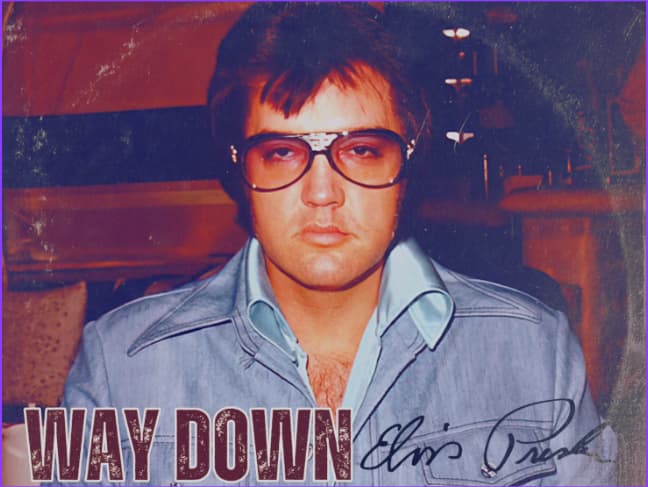
“Way Down”: A Prophetic Rumble from the King’s Twilight
Ah, the late 1970s. For many of us, it was a time of shifting sands, both in the world and in our own lives. The optimism of the 60s had faded, replaced by a more complex reality. And then there was Elvis Presley. By 1977, the King, our beloved Elvis, was a figure cloaked in both legend and an increasing fragility. He was still the inimitable showman, but the struggles were palpable. Yet, even in those final, poignant days, Elvis could still deliver a track that resonated with a profound, almost eerie, significance. Such was the case with “Way Down,” a song that, in hindsight, feels less like a mere single and more like a final, echoing whisper from a titan standing at the precipice.
Released in June 1977, just weeks before his untimely passing on August 16th, “Way Down” landed on the Billboard Hot 100 with a quiet intensity, peaking at a respectable No. 18. But its true impact wasn’t measured solely in chart positions. Across the Atlantic, in the UK, it soared to the coveted No. 1 spot, a testament to the enduring global adoration for Elvis. This dual chart performance underscores the unique space “Way Down” occupied: a solid hit in the challenging American market of the late 70s, and a reaffirmation of his regal status overseas. It was a posthumous chart-topper in both the US and UK, a bittersweet victory that further cemented its place in music history. The B-side, “Pledging My Love,” a cover of the Johnny Ace hit, added another layer of classic R&B sensibility to the release, showcasing Elvis’s eclectic taste even in his later years.
The story behind “Way Down” is tinged with a melancholy that only amplifies its power. Written by Layng Martine Jr., the song was recorded during Elvis’s last recording sessions at Graceland in October 1976. Imagine, if you will, the scene: the King, back in the familiar comfort of his home, laying down tracks that, unknown to him, would form his final musical testament. The atmosphere must have been laden with an unspoken weight, a sense of an ending perhaps not fully articulated, but certainly felt. Martine Jr. had initially written the song with a more general concept of falling deeply in love. However, in Elvis’s hands, and given the context of his life at the time, the lyrics took on a far deeper, more personal meaning.
Lyrically, “Way Down” is a deceptively simple yet profoundly evocative piece. It speaks of a downward spiral, a feeling of being pulled into an irresistible current, “way down” into something inescapable. While the original intent might have been romantic entanglement, Elvis’s delivery imbues it with a sense of weariness, perhaps even a premonition. When he sings, “And the deeper I get, the more I lose control / Like a rolling stone, I’m just a tumbleweeds soul,” one can’t help but connect it to the escalating struggles he faced – the health issues, the demands of fame, the isolation. It’s a raw, almost confessional moment, made all the more poignant by the hindsight of his passing. The song’s bluesy rhythm and Elvis’s gravelly, resonant vocals – still powerful, yet tinged with a newfound vulnerability – perfectly convey this emotional landscape. It’s not a shout of defiance, but a quiet, almost resigned acknowledgment of an inevitable descent.
For those of us who grew up with Elvis, who saw him transform from the hip-swiveling rebel to the sequined showman, “Way Down” serves as a powerful, almost spiritual, farewell. It’s a track that, even after all these years, can send shivers down your spine. It evokes memories of a time when the world seemed a little simpler, yet even then, we knew there was a profound sadness unfolding behind the glittering façade of superstardom. Listening to “Way Down” now is like looking back at an old photograph, seeing the shadows and nuances that were perhaps less apparent at the time. It reminds us not just of Elvis’s unparalleled talent, but also of his humanity, his struggles, and ultimately, his enduring legacy. It’s a song that speaks to the universal experience of facing the unknown, of being swept along by forces beyond our control, and doing so with a dignity that was uniquely Elvis’s. It’s a final, heartfelt communication from a legend, etched forever in the annals of music.